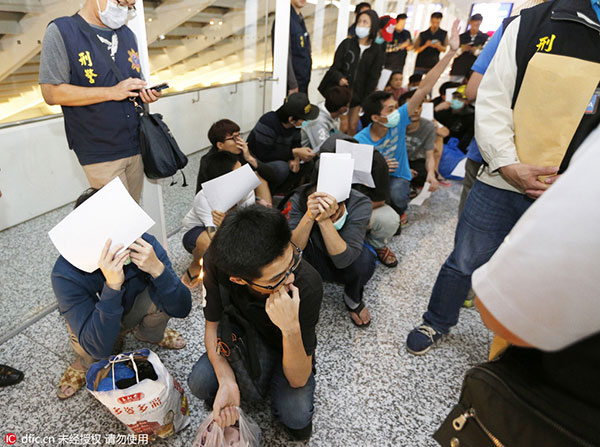 |
|
20 fraud suspects from Taiwan arrive in Taoyuan airport in Taiwan on Friday, April 15, 2016 after being deported from Malaysia. [Photo/IC] |
WHO, HOW
One suspect from Taoyuan in Taiwan, identified only by his surname Jian, traveled to Kenya to join a boiler room in 2014.
According to Jian, the organization he worked for divided its members into first-, second- and third-tier groups according to their roles. All worked off pre-written scripts when talking to their "clients."
The first-tier group, a team of about a dozen people, masqueraded as managers of medical insurance accounts to acquire their victims' personal information, Jian explained.
In the calls, the victims were told that they were victims of identity theft, and their "case" would be transferred to the police after they had confirmed certain information.
Then it was time for the second-tier group, the "police officers," to take over the case. This team informed the victims that their identities had been used to facilitate money laundering, said Jian, who was one of the "police officers."
The victims were then pressed for more information, such as family background, occupation, income and bank account details. The second-tier group would then try and wheedle out how much cash the victims had in their bank accounts.
"If there was not much money, we would talk the victims into transferring their balance to us," said Jian, "however, if they were holding large deposits we would transfer the case to the third-tier group."
Another suspect, who was identified by the surname Xu, was a member of this third-tier group. His bluff was that he was the director of the financial crime department.
"We told the victims that their money must be transferred to our 'safe account' for investigation, and instructed them how to do this at an ATM," said Xu.
The fraudsters used software that changed the numbers they called from to those registered to mainland police stations.
"Any 'savvy' victim could check the number while we were on the phone," he said, "and they would be reassured."
The gang even played recordings of police stations or hospitals as background noise during the calls to further win the trust of their unsuspecting victims.
According to the police, members of the gang received a monthly salary based on their performance. The third-tier group, usually the most skilled fraudsters, earned the most, getting up to eight percent of the money earned in each deal.
Police said that the bosses and core members of many fraud rings were from Taiwan. In Jian and Xu's case, only members of the first-tier groups were from the mainland, who were usually new to the world of telecom scams.
Investigators found that during recruitment, fraud rings often favored those with criminal records.
"I am familiar with how phone scams work, so that was why the boss asked me to join," said Xu, who served a seven month sentence for fraud in Taiwan's Taichung City in 2010.
